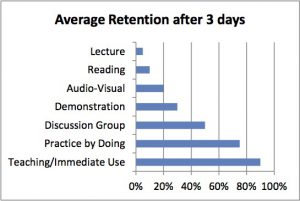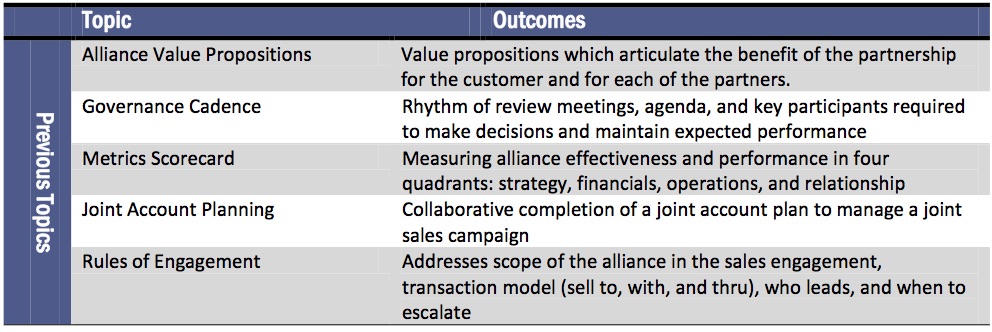Embracing Excellence in the Alliance Program
CASE STUDY
Our Client, the Enterprise Services Partner Group of major software company, was seeking to deepen their alliance management skills and to integrate more best practices into their alliance management business processes. Phoenix Consulting Group delivered a series of web-based group training, practical application, coaching and mentoring workshops based on our Alliance Life Cycle curriculum and the suite of alliance management competencies advocated by the Association of Strategic Alliance Professionals to fulfill this need.
One of the challenges of professional development is retaining the knowledge and incorporating the new learning into the day to day business practice. Reinforcement and motivation to change are critical to maximize effectiveness.

The chart at the left is adapted from the research done by National Training Labs at Bethel, Maine on learning retention. It shows what most of us intuitively understand are the limitations of classroom training. While most well-crafted training includes discussion and practice exercises, it is through immediate use that learning is best retained and the business results are realized.
The workshop model coupled with practical application has proven to be the most effective means of delving deeper into each lifecycle phase of alliance management and embedding best practices into ongoing business processes. In this model not only do we include discussion and interaction, but we include on the job ‘homework’ that requires the participants to put alliance best practices to “Immediate Use”. This is followed by a group briefing that serves as a “teach back” exercise. In the ‘teach back’ briefing, participants share how they implemented the best practice giving rise to an opportunity to share challenges and successes among the team. This is frequently the only opportunity that colleagues have to share their experiences and to pool their learning.
Format
Our client is a global organization, so to reach their entire service alliance team we repeated the webinars three times so each region (EMEA, Asia, and the US) could participate. Each topic required two sessions.
Prior to the first session, reading, and exercise templates were distributed to heighten awareness of the subject matter and to prepare the participants to learn. During the first webinar session, the instructors led the team through the concepts, theories and case examples encouraging active discussion from work experiences. The templates for the on-the-job homework were reviewed, answering questions on how to apply them. The PhoenixCG instructors also made themselves available between the two sessions to coach and mentor the alliance manager while they worked on the exercise.
At the follow-on session, thirty days later, the homework was reviewed with the alliance managers sharing their work and engaging in discussions about challenges, solutions, and lessons learned. The Phoenix instructors facilitated this discussion by pointing out the best practices of the group and providing ongoing coaching on implementation. The alliance managers were also encouraged to share their homework with their partners to further refine their tools and jointly adopt them into practice.
Topics
Below are the topics that were covered in the series. The series spanned a five month duration which ensured a prolonged period of learning, skills development, and practice adoption.

Benefits of the Program
Some of the unique benefits that are realized from this integrated approach are:
- Immediate impact on the management of existing alliances, accelerating business results.
- Created a continuous learning environment, rather than a training event.
- Collaboration within the alliance team, leading to greater efficiency and effectiveness.
- Embedded best practices into the business processes of alliance management.
- Built a community of practice to share successes and to promote group problem solving.
- Accumulate an institutional body of knowledge of alliance management.
